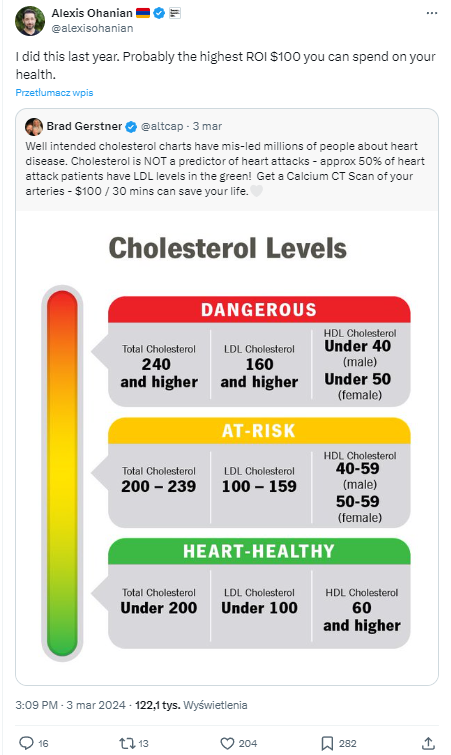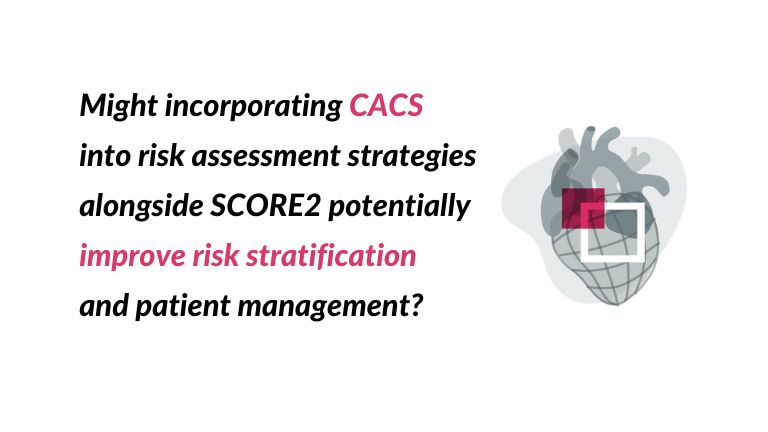CACS as a targeted cardiovascular risk stratification tool
Alexis Ohanian, Reddit co-founder, recently called calcium score tests (CACS) a valuable health investment [1]. This non-invasive test can identify early signs of coronary artery disease before symptoms appear. Ohanian emphasizes the affordability and potentially life-saving benefits of this procedure, calling it a high return on investment for your health.

Calcium Score scan that can save your life
As you may recall from our previous posts about our custom algorithm development services, we have been working on automating Coronary Artery Calcium Scoring with AI.
With a long history of research and widespread availability, CT scans for coronary artery calcium scoring (CACS) are a well-recognized tool in cardiovascular medicine. In other words, coronary artery calcification (CAC) is a proven way to predict coronary artery disease. However, there is an ongoing debate on what patients should have and not have CACS.
CACS versus traditional risk model for CVD
How to estimate the risk of cardiovascular disease? What risk assessment model should be applied? There are some existing prediction models of which Systematic Coronary Risk Evaluation emerges at the forefront. In June 2021 its updated versions (SCORE2) and SCORE2-OP (older persons) were introduced by the working group and ESC Cardiovascular Risk collaboration. The aim was to update the prediction model to estimate 10-year fatal cardiovascular disease (CVD) risk in individuals [2]. Earlier this year (2024) a group of researchers published a study to evaluate the change in cardiovascular events risk prediction ability of different prediction models [3].
Specifically, they wanted to evaluate the situation in which CACS or a genetic risk score (GRS) model, or both, is added to the mentioned SCORE2.
Redoubled predictive power
This observational study enrolled 1002 asymptomatic individuals without clinical coronary disease. To assess the predictive and discriminative ability of SCORE2, CACS, and GRS for cardiovascular (CV) events, Harrell’s C-statistics were calculated. Results? The C-statistic for CV event prediction was 0.608 for SCORE2, significantly improving to 0.749 with the addition of CACS (P = 0.001).
Might incorporating CACS into risk assessment strategies alongside SCORE2 potentially improve risk stratification and patient management?
Professor Ian Maklim Graham, an academic cardiologist and international leader in preventive cardiology, referred to the mentioned study [4]. He admits that cardiovascular risk estimation may have become somewhat static. The concept presented in the cited study may help us move from concepts to real advances in risk estimation. However, in his opinion, we should also consider other principles, such as genetic factors or in-utero risk.

Coronary Calcium Score in Cancer Patients
Of course, while the CACS improves risk prediction, it’s essential to consider the availability and cost-effectiveness of CACS scanning in broader clinical settings. Here’s an interesting example.
We already know that cancer radically alters body chemistry. Inflammation, oxidative stress, and blood clots worsen with cancer and its treatments. This boosts heart disease risk and severity in cancer patients. Moreover, immune therapies also accelerate atherosclerosis. An article, published in January this year, describes the study performed by Patel S. et al [5]. The researchers examined Cleveland Clinic records of patients with CACS. They identified cancer patients with post-diagnosis CACS and matched them by age and sex to non-cancer patients with CACS. The authors wanted to assess the burden of atherosclerosis and other cardiovascular events in cancer patients using CACS as a screening tool.
CACS as a screening tool?
Firstly, the researchers demonstrated that oncology patients may have high CACS and an increased incidence of atherosclerotic or vascular events, even with fewer traditional cardiovascular risk factors (such as hypertension, obesity, and smoking).
Additionally, cancer patients with substantial or moderate calcium buildup in the arteries had significantly more artery plaque compared to non-cancer patients. This means that cancer mechanisms triggering widespread inflammation throughout the body might accelerate Atherogenesis (the process of plaque development).
While this study didn’t investigate it, the authors’ findings suggest that calcium buildup in the arteries may be a stronger indicator of heart disease risk in cancer patients. This could introduce the need for adjusted CACS levels. Thus, more research is needed.
References:
[1] https://fortune.com/well/2024/03/12/calcium-score-test-alexis-ohanian-brad-gerstner/
[2] https://academic.oup.com/eurheartj/article/42/25/2439/6297709
[3] https://doi.org/10.1093/eurjpc/zwae005
[4] https://doi.org/10.1093/eurjpc/zwae099
[5] Patel, S., Franco, F.X., McDonald, M. et al. Use of computed tomography coronary calcium score for prediction of cardiovascular events in cancer patients: a retrospective cohort analysis. Cardio-Oncology 10, 1 (2024). https://doi.org/10.1186/s40959-023-00196-9